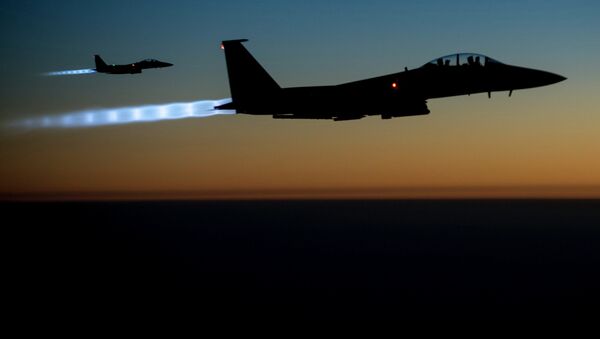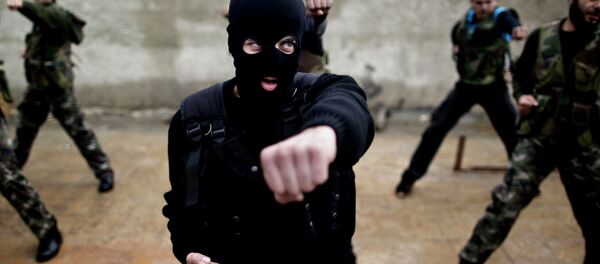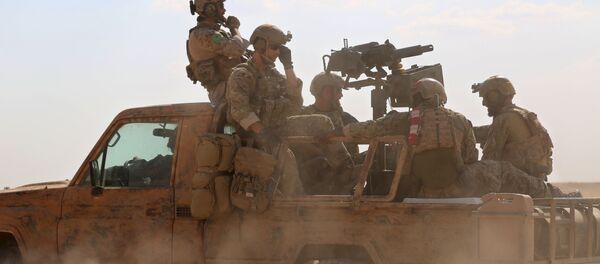Russian President Vladimir Putin has accomplished a task which Barack Obama deemed impossible in Syria, Jackson Diehl of The Washington Post notes.
"In the great American debate about Syria, there has been an intervention by Vladimir Putin — and it has made Barack Obama the loser," Diehl wrote Sunday.
When Russia stepped in in Syria, Obama predicted that Moscow would get bogged down in the Middle East. However, Obama's forecast has been proven wrong.
"Putin has proved that the concept Obama rejected — that a limited use of force could change the political outcome, without large costs — was right all along. The difference, of course, is that the result has been a victory for Russia, Iran and the Assad regime, at the expense of the United States and its Arab, Israeli and Turkish friends," he argued.
But that's half the trouble. While the US-Russia brokered deal was meant to pave the way for a peaceful settlement in Syria, Washington has failed to pressure the US-backed Syrian rebels into abiding by the agreement.
"Within the last 24 hours, 53 cases of ceasefire violations have been registered from the side of illegal armed formations in the provinces of Aleppo (26), Hama (5), Damascus (8), Homs (7), Latakia (5), and Daraa (2)," the Russian Ministry of Defense reported Monday.
Furthermore, Syrian rebels refused to withdraw from Castello Road simultaneously with the Syrian Arab Army (SAA) last week, threatening to ruin the deal.
"This indicates that the United States does not control the situation in Syria and is not ready to take steps to force US-controlled militants to implement a ceasefire," the chief of the Russian Reconciliation Center in Syria, Lt. Gen. Vladimir Savchenko, said Saturday.
On Sunday Russia's Defense Ministry called upon Washington to exert necessary pressure on the so-called "moderate" opposition in Syria.
"We insistently urge Washington to put necessary pressure on the illegal armed groups under its patronage to make them fully comply with the ceasefire conditions. Otherwise, the implementation of the full set of the Russia-US agreements, reached in Geneva on September 9, may be put under threat and it will contradict the interests of the whole international community," the statement read.
On Monday the situation further deteriorated: the United Nations' Office for the Coordination of Humanitarian Affairs (OCHA) reported that the humanitarian convoy had been shelled near the town of Urum al-Kubra northwest of Aleppo.
Despite the fact the UN signaled Tuesday that naming the perpetrator of the attack was premature, some US officials pointed the finger at Russia and Damascus, presenting no evidence to confirm their allegation.
"We don't know at this point whether it was the Russians or the regime. In either case, the Russians have the responsibility certainly to restrain — refrain from taking such action themselves, but they also have the responsibility to keep the regime from doing it," a senior US official told the Guardian.
Commenting on the developments on the ground in Syria, Yevgeny Satanovsky, head of the Moscow-based Middle East Institute, told Russian online newspaper Vzglyad that the Americans are either unable or unwilling to handle the situation.
He called attention to the fact that while the US-backed "moderate opposition" has not raised a finger to fulfill the US-Russia brokered agreement, the Syrian government accomplished its part of the deal.
On the other hand, the Deir ez-Zor attack has triggered the question on whether the US intelligence is worth nothing, or the Pentagon has shown its "commitment" to the ceasefire agreement "in such a way," the expert added.
According to Satanovsky, the controversy has reflected the ongoing covert struggle between the US State Department and the Pentagon. At the same time the US Air Force could not have attacked the SAA without the White House's tacit approval, he stressed.
For his part, Professor Vladimir Isaev of the Institute of Oriental Studies at the Russian Academy of Sciences told the media outlet that Washington both cannot and does not want to keep a tight rein on Syrian rebels, whom the White House regards as a major bulwark against the Syrian government.
Isaev noted that it would be hard to restore the trust between Moscow and Washington following the rebels' attacks and the Pentagon's airstrikes against the SAA.




